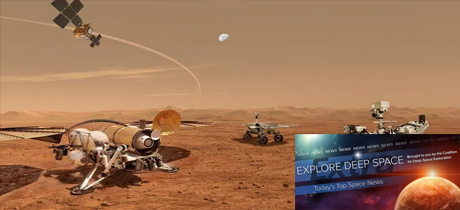In Today’s Deep Space Extra… NASA selects Lockheed Martin to develop a small launch vehicle to return samples of Mars to Earth. European policy makers to meet soon to assess space policy priorities.
Space Science
NASA picks Lockheed Martin to develop rocket for retrieving samples from Mars
Coalition Member in the News – Lockheed Martin
Republic World (2/7): NASA has selected Lockheed Martin to develop a rocket suitable for launching from the surface of Mars to return samples gathered by the agency’s Perseverance rover. The six-year Mars Ascent Vehicle Integrated System contract awarded Lockheed Martin has a value of up to $194 million. Perseverance touched down at Jezero Crater on Mars a year ago this month and is in the process of gathering and caching at least 20 samples of Martian material for return to Earth. NASA is working with the European Space Agency (ESA) on the Mars Sample Return that will require an assortment of launch vehicles, orbiters and rovers to launch no sooner than 2026. The sample return is planned for the early to mid-2030s.
The Big Bang: What really happened at our universe’s birth?
Space.com (2/7): Scientific evidence supports the theory the universe was created 13.7 billion years ago by a massive explosion that is still driving a cosmic expansion. A theoretical physics assessment, however, suggests that Einstein’s theory of relativity may not be sufficient to fully explain how the blast triggered a brief and dramatic inflation that unfolded faster than the speed of light. “Inflation was the ‘bang’ of the Big Bang,” Alex Filippenko of the University of California, Berkeley, explained to Space.com “Before inflation, there was just a little bit of stuff, quite possibly, expanding just a little bit. We needed something like inflation to make the universe big.”
Other News
Presidential science adviser lander resigns amid criticism of demeaning behavior
Spacepolicyonline.com (2/7): Eric Lander, President Biden’s science advisor and director of the White House Office of Science and Technology Policy (OSTP) resigned Monday night, following accusations that he’s been demeaning in his treatment of staff. OSTP is one of the four White House offices most engaged with space policy and programs along with the National Space Council, National Security Council, and Office of Management and Budget.
Russia wants to speed up Space Station cargo deliveries with shorter, one-orbit flights
Space.com (2/8): A statement on Roscosmos’ website says the Rocket and Space Corporation Energia (a part of the space agency) received a patent November 12 for a single-orbit cargo flight. The Russian space agency released a proposal to allow its Progress cargo ships to arrive in a single orbit, which would allow them to arrive at the complex only two hours after launch, the agency said. Testing of some elements began during the Progress MS-17 cargo flight in June and July 2021, Roscosmos stated, without providing further detail. More testing is expected in June 2022 during Progress MS-20. “Single-orbit scheme Progress flight to the ISS is to be implemented from 2023,” Roscosmos added. That timeline assumes that all testing goes to plan and that the new orbit is approved.
Defining European space ambitions
Thespacereview.com (2/7): February 16 will mark the European Space Agency (ESA) and European Union space summit, a daylong gathering of leaders in Toulouse, France, to discuss common space priorities. It’s a session that could face challenges over addressing differing priorities with available resources. Those include addressing climate concerns and desire for a satellite communications network; aspirations to develop an independent European human space launch capability and participate in NASA’s Artemis human deep space exploration initiative with a large lunar cargo lander; and perhaps lead a bold sample return mission to an outer solar system ocean world, such as Saturn’s moon Enceladus.
Space Force soliciting industry ideas for thwarting cyber-attacks
SpaceNews.com (2/7): The Space System Committee has issued a request for information from industry to provide proposals for combating cyber-attacks and protecting critical data networks during wartime. The directive initiated by U.S. Air Force Secretary Frank Kendall seeks responses by March 3. Satellite-based communications systems must be more resilient and better protected from cyber and electronic disruptions, according to Kendall. Responses will be assessed by the command to help shape the Pentagon’s funding requirements for the 2024 budget year request.
Astra scrubs launch of NASA demonstration flight
Spaceflightnow.com (2/7): Astra aborted a launch attempt Monday just prior to liftoff of its first mission from Cape Canaveral due to telemetry issues. The rocket carries four NASA-sponsored CubeSat nano-payloads as part of the ELaNA mission. ELaNA stands for “Educational Launch of Nanosatellites” and is an initiative created by NASA to help students obtain practice in space-related fields. The first countdown for the mission was halted Saturday due to radar system problems. A launch opportunity Sunday was skipped as the weather forecast was not favorable.

